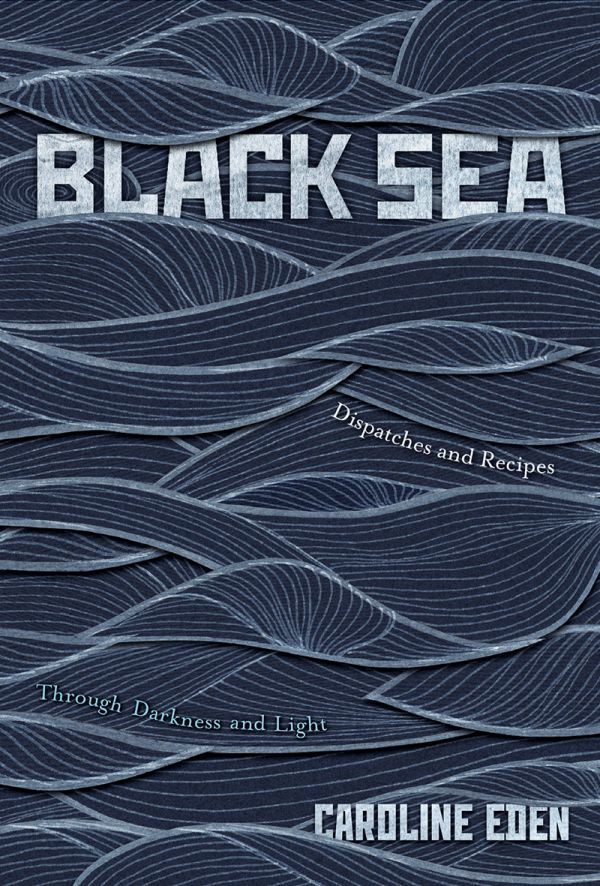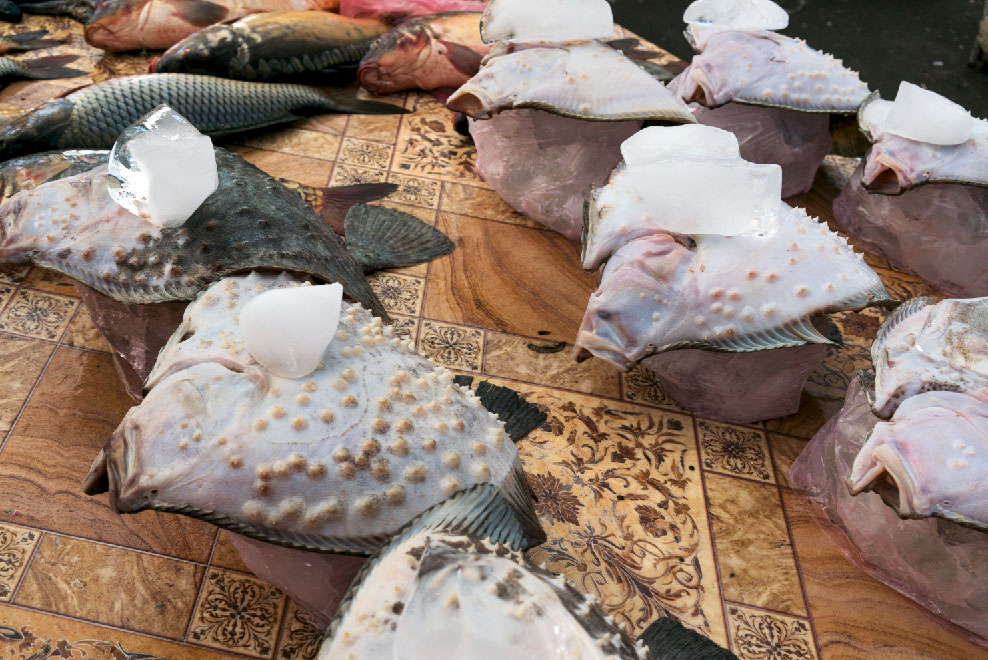Buy or gift a stand-alone digital subscription and get unlimited access to dozens of back issues for just £18.99 / $18.99 a year.
Please register at www.exacteditions.com/digital/cornucopia with your subscriber account number or contact subscriptions@cornucopia.net
Buy a digital subscription Go to the Digital Edition
Dispatches and Recipes – Through Darkness and Light
This is the tale of a journey between three great cities – Odessa, built on a dream by Catherine the Great, through Istanbul, the fulcrum balancing Europe and Asia and on to tough, stoic, lyrical Trabzon.
With a nose for a good recipe and an ear for an extraordinary story, Caroline Eden travels from Odessa to Bessarabia, Romania, Bulgaria and Turkey’s Black Sea region, exploring interconnecting culinary cultures. From the Jewish table of Odessa, to meeting the last fisherwoman of Bulgaria and charting the legacies of the White Russian émigrés in Istanbul, Caroline gives readers a unique insight into a part of the world that is both shaded by darkness and illuminated by light.
Meticulously researched and documenting meetings with remarkable individuals, this biography of a region, its people and its recipes breaks new ground and is winner of both the John Avery Award at the André Simon Awards, and the 2019 ‘Best Travel and Food Book of the Year’ at the Edward Stanford Travel Writing Awards. Cornucopia 12: The Black Sea issue, is now a collector’s item.
Caroline Eden is a travel and food writer focusing on the former Soviet Union and south Asia. She has written for various publications including the Daily Telegraph, Financial Times and the Guardian. Caroline’s first book, Samarkand, won the Guild of Food Writers Award for best food and travel book in 2017. She lives in Edinburgh, Scotland.
Caroline will be at the Borders Book Festival in Melrose on June 15th at 7.45pm.
http://www.bordersbookfestival.org/event/caroline-eden-black-sea/
‘‘The next best thing to actually travelling with Caroline Eden – a warm, erudite and greedy guide – is to read her. This is my kind of book.’ Diana Henry
‘A wonderfully inspiring book about a magical part of the world.’ Viv Groskop, author of The Anna Karenina Fix
‘Part travelogue, part recipe book, this is a love letter to “the sea that welcomes strangers”, soaked in colour, history, myth and the flavours of many cultures.’ Nick Hunt, author of Where the Wild Winds Are

The finest books of literary travel are more than just journeys through space and time – they are also love letters from the author to a place. Caroline Eden’s wonderfully lively journey around the Black Sea is by turns witty, wry and wise – but above all it’s a profoundly loving portrait of the cultures, landscapes, food and people of one of the world’s most fascinating regions.
Eden is clearly deeply influenced by the writing of Jan Morris – a debt she acknowledges in her opening quotations – and, gloriously, not only shares Morris’s deep fascination for the history that lies beneath the surface of places but also echoes her constant playfulness. Neal Ascherson, in his magisterial 1995 study of the same region, made a deeper scholarly dive into the Black Sea’s past. Eden instead chooses to put the contemporary life of the places she visits at the forefront, interspersing interviews with locals with a lively travelogue and gorgeous full-page photographs by Theodore Kaye (such as the Black Sea turbot in the Odessa fish market below, and the view from a konak in Çamlıhemşin above). Most interestingly, Eden dots her narrative with recipes from every city and country that she visits, from Odessa to Trabzon.

The result is a wholly original and vibrant new format. One can read about the decadent glory days of Odessa while munching on marinated mushrooms inspired by Nikolai Gogol’s short story ‘Old World Landowners’. The strange meeting of down-to-earth Balkan-Slav cultures with the freewheeling culture of the open sea is illustrated by a hearty Bigos stew enjoyed by the Polish national poet (and Black Sea coast exile) Adam Mickiewicz. Istanbul – whose culinary culture is shrewdly and accurately described by Eden as being heavily based on the
Black Sea coast immigrants who now dominate it – is represented by such recipes as citrus-cured mackerel with gherkins and the legendary fish soup of the Karaköy Balıkçısı restaurant, inspired by the cuisine of Ardahan, near the Georgian border, homeland of the owner. Each recipe is exquisitely illustrated with photographs by Ola O Smit.
But Black Sea is much more than a cookery book. The Black Sea is famously the place where, Ascherson believes, the concept of civilisation and barbarism was born as early Hellenic traders and colonists first met the peoples of Asia. The fault line persisted, as the sea marked the border between the Western Christian and Eastern Muslim world, and later the capitalist and communist blocs. And yet, despite the wild diversity represented by Ukrainians and Circassians, Romanians and Turks, Italians and Georgians, the sea facilitated an extraordinary mélange of cultures. Disputes over the meaning of community, nationhood, history and culture have manifested themselves in millennia of dramatic conflict, yet the sea has always united more than it has divided the peoples who inhabit its shores. “Wedged between ocean and land, all of these Black Sea destinations have something of the frontier about them,” writes Eden, “something setting them apart from their host countries.”
Eden has Morris’s light touch with history; her thorough research is worn lightly. She quotes Vladimir Jabotinsky, Mendele Mocher Sforim and Mark Twain on Odessa; Bedri Rahmi Eyüboğlu, Mikhail Bulgakov and Lord Byron on Istanbul; Rose Macaulay and Julien Bordier, squire to Baron de Salignac, French Ambassador to Constantinople, on Trabzon.
She travels thoroughly, seeking out the Russian rooftop churches of Istanbul’s Karaköy, the half-timbered mansions of the tea-farmers of Trabzon and authentic Jewish restaurants in the backstreets of Odessa. And she writes wonderfully. The courtyards of Odessa’s old city, “communal spaces, more than a veranda but less than a terrace, are where the spirit of Odessa… hangs most heavily,” she writes. “In the summer, families fill them, spreading out at long food-filled tables, gobbling down cutlets, pouring tea from enamel pots and vodka from decanters while 10-litre bottles of kompot rest with dogs in the shade. This is where the spicy smell of yellow acacia fills the air, tangling up into grape vines and travelling down into the dank, deep-sunk wells and old mazes of catacombs where the souls of long-gone partisans, smugglers and criminals live on.”
On a luminous evening near Trabzon she watches “little ships slowly returning to shore, tugging frothy white cables of bubbles behind them, jogged by land and sea winds. On nearby boulders solitary women, lost in problems, love and thought, looked out to sea, and pairs of young boys lolled like seals on the smooth rocks, resting and chatting in the last of the sun”.
Eden’s research turns up some charming surprises. Who knew that the classic Italian song ‘O Sole Mio’ was in fact written in honour of Odessa in 1898 by a Neapolitan composer, Eduardo di Capua, who had arrived in the city with his father, an orchestra violinist? Or that the Black Sea boasts an “infamous mad honey, known as deli bal, made from the rhododendron flowers that flourish in the damp Black Sea climate”? Ingesting too much is said to cause everything from blurred vision and respiratory problems to muscle paralysis, severe arterial hypotension and even death. Eden digs up a paper by William John Hamilton, the English geologist and President of the Royal Geographical Society, who researched deli bal in the 1840s. The ancient geographer Strabo (a native of the Black Sea town of Amasya, ancient Amaseia) recounts that the Heptacometae, “the wildest of the tribes who inhabit the mountains to the east of Themiscyra [near modern-day Samsun on the Turkish Black Sea] destroyed three squadrons of Pompey’s troops, by placing on the road cups of maddening honey, produced on the highest branches”.
Eden’s book is a triumph, a journey through a region of many cultures but with a shared quality of light, “an almost celestial glow, an extra layer of luminosity, a brilliance permeated by the weight of history, environmental bearing and devoutness”.
1. STANDARD
Standard, untracked shipping is available worldwide. However, for high-value or heavy shipments outside the UK and Turkey, we strongly recommend option 2 or 3.
2. TRACKED SHIPPING
You can choose this option when ordering online.
3. EXPRESS SHIPPING
Contact subscriptions@cornucopia.net for a quote.
You can also order directly through subscriptions@cornucopia.net if you are worried about shipping times. We can issue a secure online invoice payable by debit or credit card for your order.

Cornucopia works in partnership with the digital publishing platform Exact Editions to offer individual and institutional subscribers unlimited access to a searchable archive of fascinating back issues and every newly published issue. The digital edition of Cornucopia is available cross-platform on web, iOS and Android and offers a comprehensive search function, allowing the title’s cultural content to be delved into at the touch of a button.
Digital Subscription: £18.99 / $18.99 (1 year)
Subscribe now